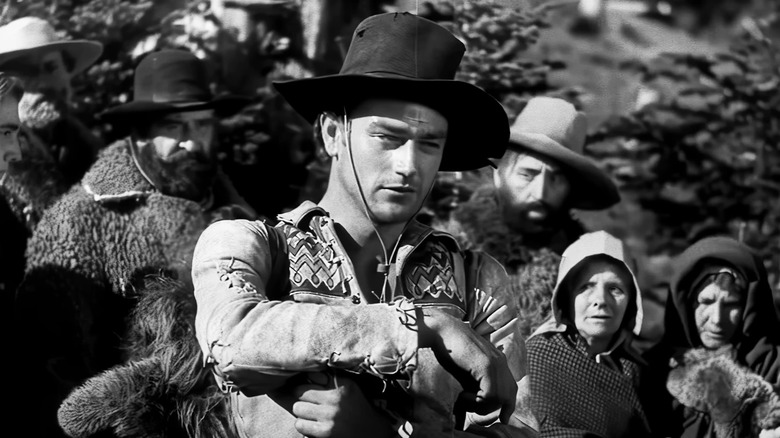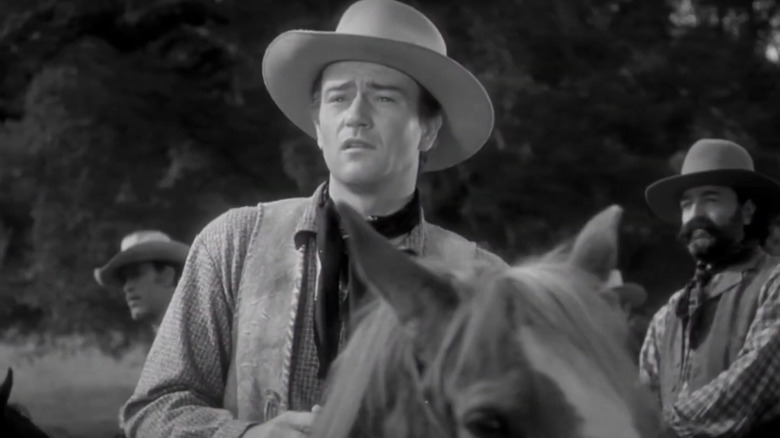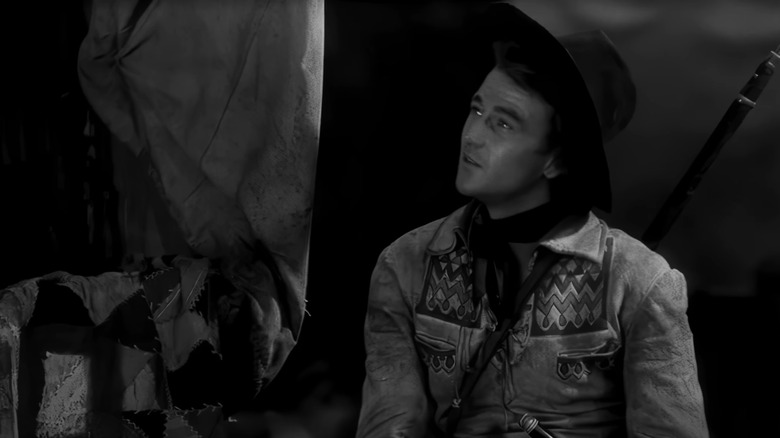One Of John Wayne's Most Important Collaborators Is Partially Responsible For The Oscars
Most film fans know that John Ford gave John Wayne his big break with 1939's "Stagecoach," much to the young actor's surprise. Having met in the 1920s when Wayne was working as a prop man (a meeting at which Wayne literally knocked over Ford) the pair would work together sporadically over the ensuing years, but only with the Duke in small non-speaking roles. Ford actually waited well over a decade to bring Wayne into the big leagues with "Stagecoach" and after that his acting career and life in general was never the same.
But that's only part of how the legend of John Wayne began. The actor, whose real name was Marion Robert Morrison, received the backing of yet another influential director early in his career when Raoul Walsh gave him his first starring role in "The Big Trail." This 1930 widescreen epic was designed to celebrate the centennial of the Oregon Trail, and featured Wayne as trapper Breck Coleman, who leads a large wagon train across the trail. Though "The Big Trail" was mostly doomed by cutting-edge camera tech and the great depression, it was impressive in its scale and very much ahead of its time in many ways. The movie was shot in a then new 70mm widescreen format known as Fox Grandeur. Scenes were filmed across seven states with more than 700 Native American actors and five different casts for English, Spanish, Italian, French, and German versions. Perhaps most importantly, however, the film introduced audiences to John Wayne as a leading man.
Though the movie failed to live up to its lofty ambitions due to the fact the Fox Grandeur format was mostly too much for theaters to accommodate, the movie was a major step in Wayne's career, especially while he waited for his other mentor, Ford, to give him the chance at toplining a major feature. But Walsh's contribution to Wayne's career didn't end with "The Big Trail" or even after the actor was cast in "Stagecoach."
Raoul Walsh was proud to have discovered John Wayne
In an interview with True West, documentarian and journalist Richard Schickel spoke about how Raoul Walsh and John Ford both felt responsible for launching John Wayne's career. "[Walsh] was very proud of, as he feels — I think it was a source of contention between he and Ford [laughs] — that he sort of found John Wayne," he said. What's more, Schnickel recalled that Walsh claimed he was the one to give John Wayne his stage name. "He said he was reading a book about the American revolutionary general 'Mad' Anthony Wayne," remembered Schnickel. "He thought Wayne would be a good name for Marion Morrison. That's how the name came about."
Elsewhere Wayne claimed that his stage name came from studio execs, but the fact Walsh wanted to take the credit at the very least shows how he felt about the Duke. There was a sense of camaraderie but also responsibility on Walsh's part, who was clearly proud to have taken Wayne from a stagehand to a leading man. "My new leading man made a fine frontiersman," Walsh wrote in his autobiography. "His acting was instinctive, so that he became whatever or whoever he was playing. Later, under the direction of John Ford, he joined the ranks of movie immortals. There is a lot of pride in the knowledge that I discovered a winner. Not only that. I also found a great American."
That's high praise considering Walsh's standing in the industry. The man wasn't just a director but a former actor who was also a founding member of the Academy of Motion Picture Arts and Sciences (AMPAS). As such, Walsh surely counts as not only one of Wayne's most important collaborators, but one of his most esteemed.
Raoul Walsh was much more than a director
Raoul Walsh was born in 1887 in New York but he had some cowboy credentials of his own. After the death of his mother, a 15-year-old Walsh travelled across Texas all the way to Montana, visiting Cuba before working as a cowboy in Mexico. His film debut came in D.W. Griffith's controversial 1915 silent epic "The Birth of a Nation" in which he played John Wilkes Booth. But Walsh is remembered much more for his directorial talents. After giving John Wayne his first starring role in "The Big Trail" he worked for Paramount but found more success at Warner Bros. where he directed the James Cagney and Humphrey Bogart gangster flick "The Roaring Twenties." 1949's "White Heat" also starred James Cagney alongside Edmond O'Brien and became one of Walsh's best known films. He only worked with Wayne one more time on the 1940s "Dark Command," which paired the Duke with fellow Western icon Roy Rogers.
Somewhere between all that, Walsh found time to co-found the Academy of Motion Picture Arts and Sciences, which has, of course, become best known for "The Oscars." In January of 1927 Metro-Goldwyn-Mayer head Louis B. Mayer gathered 36 prominent individuals from the film industry at a banquet, held at the since shuttered Ambassador Hotel. There Walsh found himself in esteemed company. Other directors included in the original 36 founding members included Cecil B. DeMille, Henry King, and John M. Stahl alongside a whole host of actors, writers, producers, and more. Sadly, Walsh himself would never once receive a nomination from the Academy he helped found despite a career punctuated by genuine classics.
Not that it necessarily mattered to him. At the time Walsh was sitting in his Ambassador Hotel banquet, Wayne was still just a prop boy for Fox. But he'd soon ascend to superstardom, helped in no small part by Walsh, who may not have given him his true breakthrough, but clearly saw the incredible potential in a young Marion Morrison. In much the same way as "The Big Trail" was ahead of its time, then, so too was Walsh in his ability to recognize true star power in a humble stagehand.


